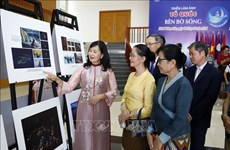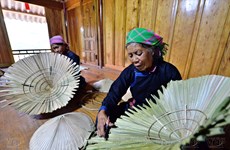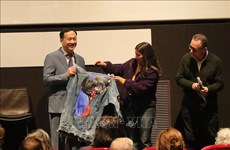Poets highlight Vietnamese literature landmarks
Vietnamese poetry over the course of history and its role in the
spiritual life of Vietnamese nationals were highlighted in a workshop
entitled “Vietnamese poetry retains the Vietnamese spirit”, held in
Hanoi on March 3.
Vietnamese poetry over the course of history and its role in the
spiritual life of Vietnamese nationals were highlighted in a workshop
entitled “Vietnamese poetry retains the Vietnamese spirit”, held in
Hanoi on March 3.
The workshop was organised on the sidelines of the third international conference on promoting Vietnamese literature in Hanoi with the participation of many local and international poets.
According to veteran poet Vu Quan Phuong, the origin of Vietnamese poetry can be traced back to the 10th century with written documents found in the pre-Le dynasty (980-1009), which then flourished in the Ly and Tran dynasties (1009-1225) – (1225-1400).
The majority of authors during this period were Buddhist priests, leading the poetry to reflect Buddhism’s succinct style and popular thoughts.
Poetry reached its peak under King Le Thanh Tong with an imperial palace poetry club, which made great contributions to the development of Vietnamese poetry.
Skilled poets emerged during Europe’s bourgeois revolution, including Nguyen Du, a master of human psychology and life.
During the French colonial period, many talented poets with unique styles formed a Vietnamese classic poetry full of realistic and humanitarian values, including Ho Xuan Huong, Ba Huyen Thanh Quan, Nguyen Khuyen and Tran Te Xuong. The great poet of feudal intellectuals, Cao Ba Quat, also came forth during this period
What is considered modern poetry began in 1930 with the New Poetry movement initiated by The Lu and followed by Xuan Dieu, Huy Can, Han Mac Tu, and Che Lan Vien.
Revolutionary poetry also introduced many accomplished poets like To Huu, Quang Dung, Nguyen Dinh Thi, Van Cao, Chinh Huu, Pham Tien Duat and Nguyen Khoa Diem.
According to poet Vu Duy Thong, a highlight of Vietnamese poetry is poems on wars, which carry popular humanitarian values, peaceful aspirations, and wishes for humankind to live in love and happiness.
In poet Tuyet Nga’s point of view, Vietnamese poetry in the late years of the 20th century and early years of the 21st century has undergone a transformation from homogeneity to diversity.-VNA
The workshop was organised on the sidelines of the third international conference on promoting Vietnamese literature in Hanoi with the participation of many local and international poets.
According to veteran poet Vu Quan Phuong, the origin of Vietnamese poetry can be traced back to the 10th century with written documents found in the pre-Le dynasty (980-1009), which then flourished in the Ly and Tran dynasties (1009-1225) – (1225-1400).
The majority of authors during this period were Buddhist priests, leading the poetry to reflect Buddhism’s succinct style and popular thoughts.
Poetry reached its peak under King Le Thanh Tong with an imperial palace poetry club, which made great contributions to the development of Vietnamese poetry.
Skilled poets emerged during Europe’s bourgeois revolution, including Nguyen Du, a master of human psychology and life.
During the French colonial period, many talented poets with unique styles formed a Vietnamese classic poetry full of realistic and humanitarian values, including Ho Xuan Huong, Ba Huyen Thanh Quan, Nguyen Khuyen and Tran Te Xuong. The great poet of feudal intellectuals, Cao Ba Quat, also came forth during this period
What is considered modern poetry began in 1930 with the New Poetry movement initiated by The Lu and followed by Xuan Dieu, Huy Can, Han Mac Tu, and Che Lan Vien.
Revolutionary poetry also introduced many accomplished poets like To Huu, Quang Dung, Nguyen Dinh Thi, Van Cao, Chinh Huu, Pham Tien Duat and Nguyen Khoa Diem.
According to poet Vu Duy Thong, a highlight of Vietnamese poetry is poems on wars, which carry popular humanitarian values, peaceful aspirations, and wishes for humankind to live in love and happiness.
In poet Tuyet Nga’s point of view, Vietnamese poetry in the late years of the 20th century and early years of the 21st century has undergone a transformation from homogeneity to diversity.-VNA













